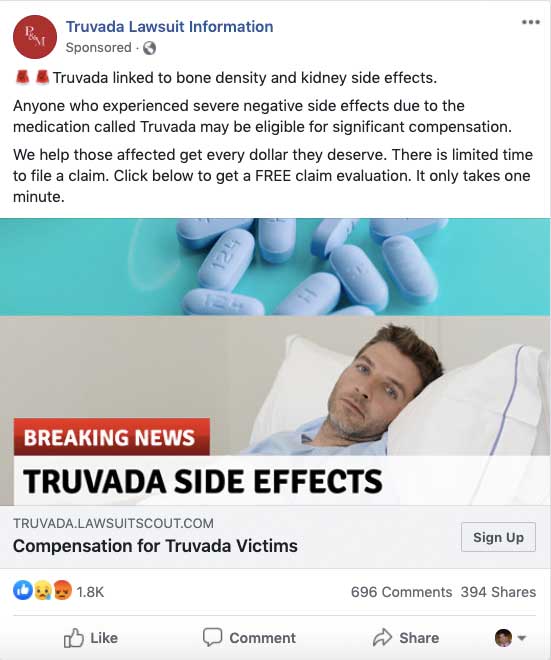Damon L. Jacobs started using Truvada for PrEP in 2011 and continues to take it daily. Personal-injury lawyers have been targeting the HIV-prevention drug and its maker, Gilead Sciences, through Facebook and Instagram ads encouraging individuals to contact the firm for potential legal compensation if they experienced negative side effects.
However, even after taking the drug for almost a decade, Jacobs has not felt any of the kidney injuries or bone problems specified in the ads.
“You know what the side effects are? I feel amazing,” the New York-based HIV-prevention specialist said. “I feel healthy and I’m having the best sex of my life.”
Jacobs runs PrEP Facts: Rethinking HIV Prevention and Sex, a private Facebook group where more than 21,000 people across the globe discuss PrEP. Among the topics discussed are these ads, which many members said they reported to Facebook for removal with varying degrees of success. The ads state Truvada, which was approved by the U.S. Food and Drug Administration in 2012, causes chronic kidney disease, osteoporosis, bone fractures, renal failure and other issues.
“The facts just do not substantiate that for PrEP at all,” Jacobs said. “As a matter of fact, Truvada for PrEP has a considerably high safety rating. It is extremely unusual for a person using Truvada for PrEP, [who doesn’t have] co-existing medical issues, to have side effects.”
Jacobs is not the only person speaking out against these ads. GLAAD, along with dozens of public-health and LGBTQ organizations, signed an Open Letter to Facebook in December requesting the social-media site remove these ads and review their advertising policies.
“By focusing on ‘Truvada’ and PrEP — rather than ‘Tenofovir Disoproxil Fumarate’ (or TDF) and HIV positive individuals who use it as an antiviral — the law firms’ advertisements are scaring away at-risk HIV negative people from the leading drug that blocks HIV infections,” the letter reads. “This is despite numerous studies underscoring the safety of TDF in HIV-negative PrEP users.”
Facebook began taking down the ads as early as January but they continue to pop up on news feeds despite these efforts.
Where did these ads come from?
The ads first appeared in 2018 when two southern California men filed a lawsuit against Gilead Sciences alleging they were harmed due to the biopharmaceutical company appearing to delay development of a safer tenofovir, an antiviral medication used to treat HIV, called tenofovir alafenamide (TAF). The aforementioned drug is less toxic to patients’ kidneys and bones than tenofovir disoproxil fumarate (TDF). Additionally, the lawsuit claims Gilead hid the effects of TDF and withheld the release of TAF to maximize profits. The plaintiffs allegedly suffered “additional accumulated kidney and bone toxicity.”
Some of the earliest lawsuits received funding from the AIDS Healthcare Foundation (AHF), a global nonprofit provider of HIV-prevention services, testing and healthcare for HIV patients. HIV/AIDS activists, including Jacobs, have denounced the nonprofit for spreading “false scare tactics and wrong information.”
Jacobs noted an HIV-negative friend who used to read AHF ads about PrEP’s negative side effects in LGBTQ newspapers.
“It never occurred to him that those side effects were extremely rare and he did eventually start using PrEP for himself but it took him another four years before he got the information he needed to make the rational medical decisions to decide PrEP was correct for him.”
Sokolove Law, which has offices in Conshohocken, is one of the firms participating in these lawsuits.
“Pharmaceutical companies should never be allowed to exploit American people — especially those suffering from a life-threatening infection,” the ad states. “That’s why the lawyers partnering with Sokolove Law stand firm with HIV patients to recoup the money and quality of life they lost after putting their faith in Truvada and similar drugs.”
Representatives from Sokolove Law did not respond to repeated requests for comment.
What do experts say?
Despite the allegations in these lawsuits, researchers say the benefits outweigh the detriments of PrEP. The Center for Disease Control found that daily PrEP reduces the risk of getting HIV through sex by about 99 percent and through injecting drugs by at least 74 percent.
Researchers at the University of California San Francisco said those who used Truvada daily only had a one percent average decrease in bone mineral density in the spine and a 0.5 percent decline in the hip. Furthermore, cisgender men who have sex with men can opt to take PrEP during periods of time when they’re sexually active rather than every day. Open Forum Infectious Diseases also found PrEP “favorably compares with aspirin in terms of user safety” in 2016.
Lastly, research presented at the Conference on Retroviruses and Opportunistic Infections (CROI 2016) showed only modest kidney declines occur in individuals over 50 and those with pre-existing kidney problems.
So is PrEP actually safe?
Ronda B. Goldfein, executive director of AIDS Law Project of Pennsylvania, said individuals who use or plan to use PrEP should take information from these ads as a jumping-off point for a conversation with their doctor.
“We know all drugs have side effects,” Goldfein said. “I think we want the person taking the drugs to be able to have a trusted person — somewhere between the lawyers who are trying to get them to sign up and the pharma company that’s saying [the drug is] completely fine — and that would be their healthcare provider.”
Meanwhile, Jacobs encourages others to look into PrEP statistics on their own.
“When in doubt, learn the facts,” he said. “Trust the facts. Trust the science. It’s very clear.”

